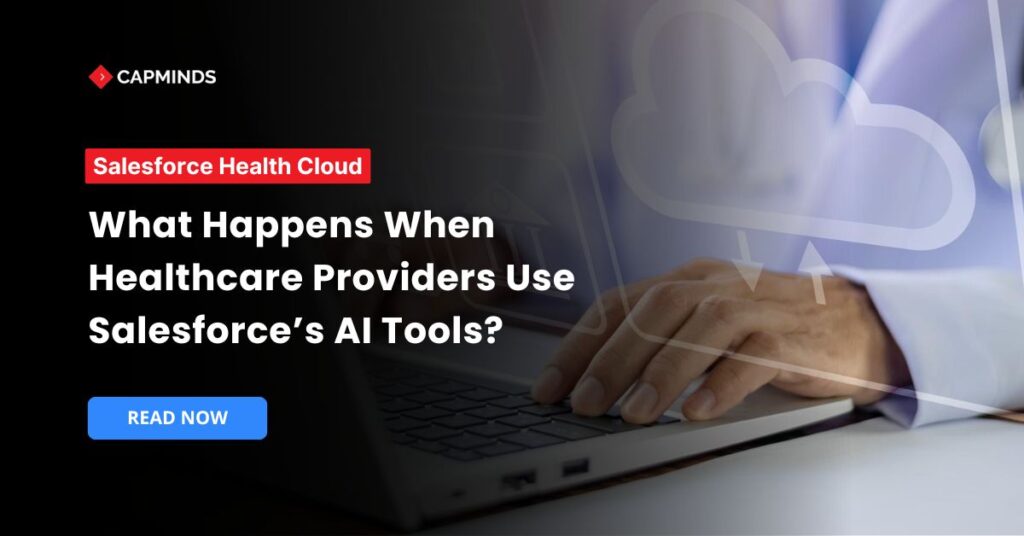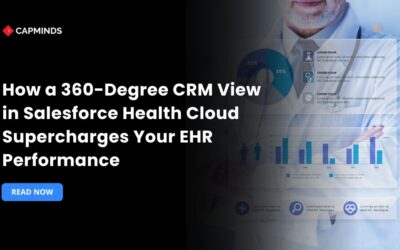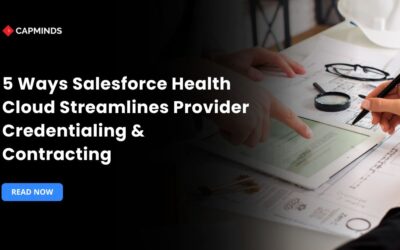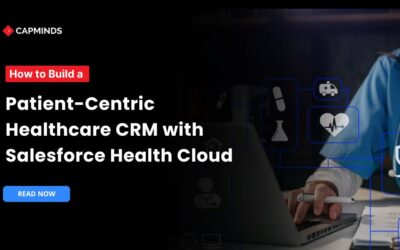What Happens When Healthcare Providers Use Salesforce’s AI Tools?
Healthcare providers and staff members often face many challenges like paperwork, administrative tasks, disconnected patient records, etc. These issues make it harder for healthcare providers and care teams to spend quality time with patients. This is the point where AI comes in with a solution.
AI-powered tools like Salesforce Health Cloud help to automate repetitive tasks of providers, organize patient information in one place, and improve communication.
In this blog post, we have shared the common challenges of healthcare providers, the impact, and how Salesforce Health Cloud’s AI tools help to solve these problems.
What is AI in Healthcare?
AI in healthcare involves the application of advanced algorithms and machine learning to analyze complex medical data. The global AI in healthcare market was valued at more than $11 billion in 2021 and is expected to reach around $188 billion by 2030. This technology aids in various aspects, including:
- Assisting in identifying diseases through image analysis and pattern recognition.
- Recommending personalized treatment options to providers based on patient data.
- Enhance patient monitoring and follow-up care through predictive analytics.
Healthcare providers can use AI to enhance patient outcomes, streamline operations, and lower costs.
Common Challenges Faced By Healthcare Providers
Healthcare providers used to face many challenges in day-to-day operations which could be solved by AI-powered solutions. But before that, understanding the challenges is important. Here are some of the common challenges:
1. Administrative Overload and Inefficiencies
- Healthcare providers sometimes face heavy administrative tasks such as scheduling, billing, and documentation.
- These responsibilities can take up significant time that could be better spent providing patient care.
- The complexity of handling patient information across several systems worsens the inefficiencies.
2. Time Constraints Reducing Patient Interactions
- The load of administrative tasks reduces the time that healthcare practitioners can dedicate to direct interactions with patients.
- This decrease in face-to-face time might severely affect patient satisfaction and the overall quality of care.
- Moreover, providers have fewer opportunities to engage with patients and address their concerns thoroughly.
3. Disconnected Patient Records Across Systems
- Patient data is frequently segregated on several platforms.
- This fragmentation makes it difficult for providers to access entire patient records quickly.
- Also, this may result in delayed or poor care decisions.
4. Difficulty in Deriving Meaningful Insights from Data
- The healthcare industry creates massive amounts of data every day.
- However, the volume and complexity of this data make gaining useful insights difficult.
- Without advanced analytical tools, identifying trends that could inform treatment regimens or enhance operational efficiency is challenging.
The Impact of These Challenges in Healthcare
These challenges significantly impact healthcare negatively. Here is how:
1. Increased Burnout Among Healthcare Professionals
- The long-term impact of administrative overburden and time pressure leads to burnout among healthcare providers.
- Continuous multitasking and the need to manage both clinical and administrative activities can cause stress, exhaustion, and decreased job satisfaction.
2. Delays in Patient Care and Poor Patient Experiences
- Inefficiencies caused by disconnected systems and administrative costs might result in delays in patient care delivery.
- Patients may have longer wait times for appointments and getting their lab results or medical records.
3. Financial Losses Due to Operational Inefficiencies
- Operational inefficiencies like repetitive processes and manual data entry can cause significant monetary losses for healthcare businesses.
- Resources have been wasted on tasks that could be simplified or automated.
- This thus diverts funding away from patient care efforts and risks the organization’s financial stability.
Salesforce Health Cloud and Its AI-Powered Tools
Salesforce Health Cloud is a Healthcare CRM software that combines all clinical and non-clinical data in a single comprehensive platform to enable healthcare providers to deliver personalized care. The added EHR integration along with 360-degree visibility into all patient information can coordinate care better and enhance patient engagement.
Salesforce Health Cloud has an AI-powered tool called Einstein AI. This powerful tool uses conversational AI to automate activities, such as
- Scheduling appointments
- Referrals
- Updating patient data.
Certain integrations work towards minimizing healthcare professionals’ administrative workload and enable them to spend more time with patients.
Clinical assessments and paper-based surveys are converted into digitized forms through Health Cloud’s Assessment Generation feature that helps in efficient data capturing and tracking. By using such AI capabilities, healthcare organizations can increase their operational efficiency and provide patients with more personalized experiences.
Related: Top 7 Features of Salesforce Health Cloud You Should Know
How Salesforce Health Cloud AI-Powered Tools Help Providers
Salesforce Health Cloud’s AI-powered tools help healthcare providers solve daily operational challenges. Here are the ways Salesforce Health Cloud AI Helps providers:
1. AI-Powered Scheduling and Patient Follow-ups
- Salesforce Health Cloud integrates AI to automate scheduling and patient follow-ups.
- The software can send automated reminders and optimize appointment schedules based on patient data and preferences.
- This automation reduces the administrative strain on staff while increasing patient engagement.
2. Reducing Paperwork with Digital Workflows
- The platform provides digital workflows to reduce paperwork by digitizing forms and automating documentation processes.
- AI helps auto-populate patient information and detect incomplete records.
- This reduction in manual paperwork enables healthcare providers to concentrate on patient care.
- Salesforce’s AI solutions are designed to effortlessly connect with current systems to ensure no disruption in workflow.
3. Personalized Care Plans through AI-Driven Insights
- Salesforce Health Cloud uses artificial intelligence to evaluate patient data and produce individualized treatment plans.
- The technology gives tailored recommendations based on individual health data and history.
- The system will allow to delivery of more proactive and customized patient care.
4. Smart Chatbots for 24/7 Patient Support
- The platform includes AI-powered chatbots that offer round-the-clock patient support.
- These chatbots can answer basic questions, provide health information, and assist in appointment scheduling.
- This is to ensure that patients have access to assistance whenever needed.
- Continuous support increases patient involvement and satisfaction.
5. Unified Patient Records with AI-Powered Data Integration
- Salesforce Health Cloud unifies patient records by integrating data from various sources into a single platform.
- AI facilitates the seamless merging of information.
- It provides healthcare providers with a comprehensive view of patient histories.
6. Faster Decision-Making with Predictive Analytics
- The platform’s predictive analytics capabilities enable faster and more informed decision-making.
- Healthcare practitioners might take a proactive approach by examining trends and projecting probable health issues.
- This foresight enables better resource allocation and care planning.
CapMinds Salesforce Health Cloud Services for AI-Driven Healthcare
CapMinds empowers healthcare providers with AI-enhanced Salesforce Health Cloud solutions, streamlining patient engagement, optimizing workflows, and driving data-driven decisions.
We provide end-to-end Health Cloud implementation, including strategy, customization, and seamless EHR, RPM, and billing system integrations to enhance care delivery.
Our AI-powered automation reduces administrative burdens, accelerates patient follow-ups, scheduling, and predictive analytics, and ensures secure data management.
Why Choose CapMinds?
✔ We integrate the latest AI and automation tools within Salesforce Health Cloud to boost efficiency and patient satisfaction.
✔ Our team specializes in AI-driven workflow optimization, system security, and interoperability.
✔ We ensure your Health Cloud system meets HIPAA, HL7 FHIR, and security standards.
CapMinds also tackles common Salesforce Health Cloud challenges, optimizing data encryption, bulk data processing, and workflow flexibility with AI-driven solutions.
With hands-on training, 24/7 support, and compliance with HIPAA, HL7 FHIR, and AI security standards, we future-proof your healthcare system.
Unlock the full potential of AI in healthcare with CapMinds’ Salesforce Health Cloud solutions.
Partner with us to elevate patient care, reduce costs, and enhance operational efficiency today!




